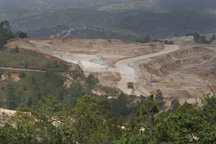
|
 |
 |
 Business News | May 2008 Business News | May 2008  
Latin America: Report Slams Canadian Mining Industry
 Cyril Mychalejko - UpsideDownWorld.org Cyril Mychalejko - UpsideDownWorld.org
go to original


| | (James Rodriguez) | | |
An independent report published last month condemns the business practices of Canada's Goldcorp Inc. and exposes the Canadian mining industry's often socially and environmentally destructive practices throughout the hemisphere.

Investing in Conflict—Public Money, Private Gain: Goldcorp in the Americas, is about the "nexus of mining companies, the mainstream media, the Canadian government, International Finance Institutions and bought off NGOs" that is working "hard to keep the reality of large-scale, open pit mines out of picture, keep[ing] community resistance marginalized, and no matter what, to keep talking about 'development'."

"The idea is to encourage debate and discussion about the effects of mining megaprojects, from Canada to Argentina, using Goldcorp's mines as case studies," said Dawn Paley, an independent journalist who penned the report with Sakura Saunders, and the assistance of Rights Action and MiningWatch Canada.

"Deforestation, erosion, water contamination and water shortages are common issues in mining affected communities. Contrary to industry spin, two hundred jobs over 10 years does not mean entire villages are happy and employed," the report states. "Increased violence, alcoholism and prostitution can turn peaceful villages into conflict zones: San Miguel Ixtahuacan, the village closest to Goldcorp's Marlin mine, has implemented a 10 p.m. curfew because of the jacked up tensions in the community since the company arrived."

Goldcorp, based in Vancouver, Canada, is one of the world's largest gold mining companies. The report features Goldcorp's operations in Canada, the U.S., Mexico, Honduras, Guatemala, the Dominican Republic, and Argentina. It also points out that "50 percent of newly mined gold is taken from Indigenous lands."

The Dominion, an independent monthly newspaper from Canada, reported last month that Jantzi Research, an independent research firm, recommended Goldcorp be considered ineligible for socially responsible investment (SRI) portfolios. Jantzi, which evaluates and monitors the social and environmental performances of securities, based its decision on growing local opposition to its Marlin Mine in Guatemala, the company's failure to properly addressing community health problems resulting from its San Martin Mine in Honduras, and for being the highest fined company for environmental offences on the Toronto Stock Exchange.

While "Investing in Conflict" largely focuses on the behavior of Goldcorp, Grahame Russell, co-director of Rights Action, stresses that the report's significance is not about exposing the behavior of a "bad apple," but rather about highlighting the fact that there is a "systemic industry issue." Rights Actions is a community development, environmental and human rights organization which has been working with communities in Central America since the late 1990's—when companies like Goldcorp started invading the region.

"Industry mainstays like the Mining Association of Canada and the Prospectors and Developers Association of Canada continue to lobby for lower taxes and more lax environmental standards in Canada and the world over; the Canadian International Development Agency helps Canadian mining companies across Latin America and globally by financing and assisting mining law "reform" and the "modernization"; and Canadian embassies worldwide provide services, political sway and promotion for Canadian mining companies," the report states.

For Paley, the report's author, "The key question…is who benefits, and who pays for these mining operations."

Her investigations and reporting concluded that: "The answer to this question, too often, is that huge benefits flow to a small group of North American mining executives and shareholders, while entire communities pay the price of water, land and air contamination, increased water competition, increased militarization and repression, alcohol and drug use, violence and prostitution in their villages."

Russell believes that Canadians need to take the lead in reining in this reckless industry.

"More change has to come from the north and specifically from Canadians. We need to hold the governments and companies accountable. We're the owners, investors, and beneficiaries of the mining from these companies," he added.

Cyril Mychalejko is an editor at www.UpsideDownWorld.org. | 
 | |
 |



